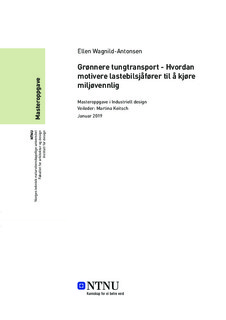| dc.contributor.advisor | Keitsch, Martina | |
| dc.contributor.author | Wagnild-Antonsen, Ellen | |
| dc.date.accessioned | 2019-10-15T14:01:33Z | |
| dc.date.available | 2019-10-15T14:01:33Z | |
| dc.date.issued | 2019 | |
| dc.identifier.uri | http://hdl.handle.net/11250/2622362 | |
| dc.description.abstract | Bakgrunn
Norge skal bli et lavutslippssamfunn. Fram til 2050 har vi som mål å redusere klimagassutslippene med 80 til 95 prosent i forhold til de utslippene vi hadde i 1990. Transport er den største kilden til disse utslippene i landet, og tunge kjøretøy og varebiler har nå nesten like høye samlede utslipp som personbiler. Skal Norge lykkes med å nå dette målet, kan alle bidra med bærekraftige tiltak - også transportindustrien.
Mål
Målet med oppgaven er å foreslå et konsept for å fremme miljøvennlig kjøring, og med det synliggjøre potensialet bransjen besitter.
Metode
Oppgaven har hatt Double Diamond-prosessen som et overordnet rammeverk. Gjennom teoristudier og kontinuerlig aktørinvolvering har jeg undersøkt sjåførenes innstilling til å kjøre miljøvennlig, og hvilken tilnærming konseptet må ha for å motivere de viktigste aktørene.
Viktig innsikt
Funn i oppgaven avdekker at dette er en stolt og viktig bransje. Sjåførene ønsker å føle seg verdsatt og anerkjent på arbeidsplassen, og motiveres av forbedring og poengklatring. Volvos flåtestyringssystem Dynafleet er et nyttig verktøy for å promotere og fasilitere en miljøvennlig kjøreatferd, og dette er et system som bør belyses og utnyttes i større grad.
Resultat
Oppgaven foreslår et konsept som spiller på ferdighetene og motivasjonen til de aller beste sjåførene. Disse sjåførene utnevnes til mentor i bedriften, og får dermed anerkjennelse av ledelse og kolleger. Mentorene bruker sin erfaring og kunnskap til å belyse fordelene ved en miljøvennlig kjøreatferd, og hjelper andre med å forbedre sin egen prestasjon, samtidig som de andre aktørene i bransjen får direkte eller indirekte nytte av dette. | |
| dc.description.abstract | Background
Norway has decided to transition into a low-carbon society. Until 2050 we have a goal of reducing greenhouse gas emissions with 80 to 95 percent of what they were in 1990. Transportation is the main source of these emissions in this country, and heavy vehicles and vans now have almost as high total emissions as passenger cars. If Norway is to succeed with reaching the goal, everyone can contribute with sustainable measures - even the transport industry.
Goal
The goal of this thesis is to propose a concept that promotes eco-friendly driving behavior, and thus highlight the potential that this industry posesses.
Method
The thesis has used the Double Diamond process as an overarching framework. Through literature review and continuous involvment with actors, I have investigated the driver’s attitude towards driving eco-friendly. This has in turn lead to ideas about which approach the concept must have in order to motivate the most important actors.
Important findings
Findings from the thesis reveal that this is a proud and important industry. The drivers want to feel appreciated and recognized in the workplace and are motivated by improvement and gamification elements. Volvo’s fleet management system Dynafleet is a useful tool for promoting and facilitating an eco-friendly driving behavior, and this is a system that should be highlighted and exploited to a greater extent.
Result
The thesis proposes a concept that uses the skills and motivation of the very best drivers. These drivers are appointed as mentors in their respective companies, thus gaining recognition from management and colleagues. The mentors use their experience and knowledge to shed light on the benefits of eco-friendly driving behavior, and help others improve their own performance. | |
| dc.language | nob | |
| dc.publisher | NTNU | |
| dc.title | Grønnere tungtransport - Hvordan motivere lastebilsjåfører til å kjøre miljøvennlig | |
| dc.type | Master thesis | |
